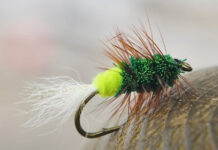The common loon. Jay “Mac” Davis
The Common Loon is well known to everyone who lives or visits Maine. Loons could be viewed as the mascot (along with the Moose) for Maine tourism. Even people who aren’t birders, hope to see and hear a loon when they visit our area. (Photo by Jay “Mac” Davis.)
Loons are large, heavy-bodied birds that spend much of their time in water. They are awkward on land. Their feet are located so far back on their bodies that they are useless for walking. But put them in water, and those large webbed feet propel a fish-seeking torpedo. They have a large, stout bill supported by a think neck. Their broad backs provide a floating platform for their chicks which leave the nest almost immediately after hatching. A bonded pair raise their young and stay together most of the summer. As the fall progresses, loons leave our ponds. Most travel east to the coast where they winter over on ice-free bays.
One of the biggest threats they face is lead poisoning from lead sinkers and lures. Loons need gravel in their crop to digest food. Lead sinkers blend into pond bottoms and are indistinguishable from pebbles they seek. Consuming these sinkers can be deadly. Fisherman can help avoid this problem by shifting to lead-free sinkers and lures. So, check your tackle box and upgrade to lead-free.
Most locals have a favorite story about loons. Mine is told by Mac Davis and Frank Vogt. On one fishing trip, Mac and Frank were tormented by a pair of loons with an unusual fishing strategy. Fly fishing from a canoe, Mac hooked a ten-inch Brook Trout. Frank watched from the bow as Mac fought the fish. After a sudden jerk, Mac realized a loon had grabbed his fish in an underwater attack. It surfaced a few yards away, and juggled the fish so it could be swallowed. Mac saw the loon wasn’t in danger of being hooked and gave a terrific yank on his rod. It worked. The fish popped free, sailed through the air in a perfect arc and smacked Frank in the back of the head. It then flopped into the water where the second loon was waiting. Off it went. As his line ran out again, Mac got ready. As soon as the loon surfaced, he jerked the fish free and, reeling furiously, got it into the boat. I don’t know if loons tell stories about the “one that got away,” but Mac and Frank told that story for years to come.
James Reddoch, of Albany Township and Boston, leads birding events for the Mahoosuc Land Trust. Visit Mahoosuc Land Trust at 162 North Road, Bethel, ME. To learn more visit www.mahoosuc.org. To contact James, send your emails to [email protected]
Related Stories
Credit: Source link































